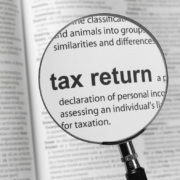The New Home Energy Improvement Credit Is Bigger and Better
- Learn about the history of the credit.
- Find information about the new law enhancements.
- Learn about extensions.
- Find information about the home energy credit’s limits.
- Learn how a home energy audit can help you.
- Learn about the identification number requirement.
- Get information on other issues regarding the credit.
Going all the way back to 2006, except for 2008, the federal tax code has offered a tax credit for making energy-saving improvements to a taxpayer’s home. This credit had expired after 2021 but it now has renewed life! The Inflation Reduction Act of 2022 substantially enhanced the home energy improvement credit.
Under the old law, the credit had a lifetime cap of $500. Many taxpayers had taken advantage of it in the previous 16 years. Others could not remember if they had used the entire lifetime credit during those years. As a result, with a lifetime cap of only $500, and a small credit rate of only 10%, the credit had become less of an incentive for taxpayers to make energy-saving improvements to their homes. In fact, homeowners frequently disregarded it.

Valuable new home energy improvement credit for energy-saving improvements to homes
Now with the passage of the Inflation Reduction Act of 2022, this credit once again becomes a meaningful incentive for taxpayers to make energy-saving improvements to their homes. The new legislation not only did away with the minimal $500 lifetime limit by replacing it with a $1,200 annual limit. It also increased the credit rate from 10% to 30% effective January 1, 2023.
The legislation also made the changes retroactive to include home energy-saving improvements for 2022 and extending the credit through 2032.
As before, under prior law, there are certain credit limits that apply to the various types of energy-saving improvements. Although not a complete list, the following are credit limits that apply to various energy-efficient improvements under the new law:
- $600 for credits with respect to residential energy property expenditures, windows, and skylights.
- $250 for any exterior door ($500 total for all exterior doors).
- $300 for residential qualified energy property expenses
- Notwithstanding these limitations, a $2,000 annual limit applies with respect to amounts paid or incurred for specified heat pumps, heat pump water heaters, and biomass stoves and boilers.
- The $1,200 credit amount increased by up to $150 for the cost of a home energy audit.
- The new law adds Air Sealing Insulation as a creditable expense.
- However, the new law eliminates treatments of roofs as creditable after 2022.
Under the new law, the one making the improvements and claiming the credit need only be a resident of the home and not necessarily the owner.
Home Energy Audit
A home energy audit is an inspection and written report for a dwelling unit located in the United States and owned or used by the taxpayer as the taxpayer's principal residence which:
- Identifies the most significant and cost-effective energy efficiency improvements with respect to such dwelling unit. It includes an estimate of the energy and cost savings with respect to each such improvement, and
- Is conducted and prepared by a home energy auditor that meets the certification or other requirements specified by IRS. The amount of the credit allowed with respect to a home energy audit can't exceed $150.
Identification Number Required for Home Energy Improvement Credit
The Act added a new provision that bars the credit unless the energy-saving item is produced by a qualified manufacturer. The taxpayer must also include the qualified product identification number of the item on their tax return for the tax year they claim the credit. However, that requirement does not take effect until after December 31, 2024, giving qualified manufacturers time to comply.
Other Credit Issues:
- It is a nonrefundable personal tax credit and is allowed against the alternative minimum tax (AMT) if the taxpayer is subject to the AMT.
- There are no credit carryover provisions if the credit is not fully utilized in the year of the home energy improvements.
- Unlike the solar credit, this credit doesn't have any specific prohibitions against swimming pools or hot tubs.
Have questions related to how you might benefit from the enhanced and extended tax credit for making energy-saving improvements to your home? Call Fiducial at 1-866-FIDUCIAL or make an appointment at one of our office locations to discuss your situation.
Ready to book an appointment now? Click here. Know someone who might need our services? We love referrals!









